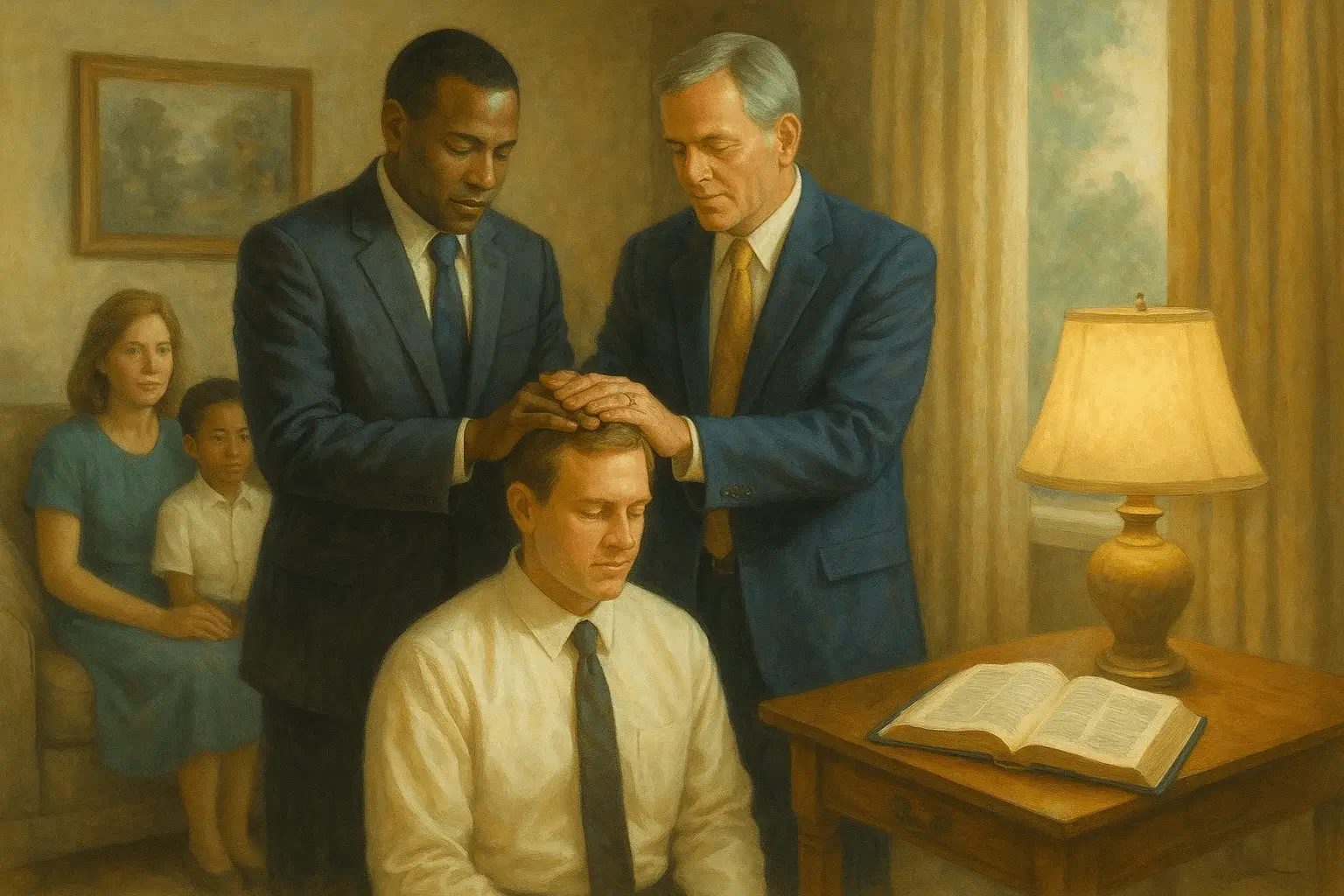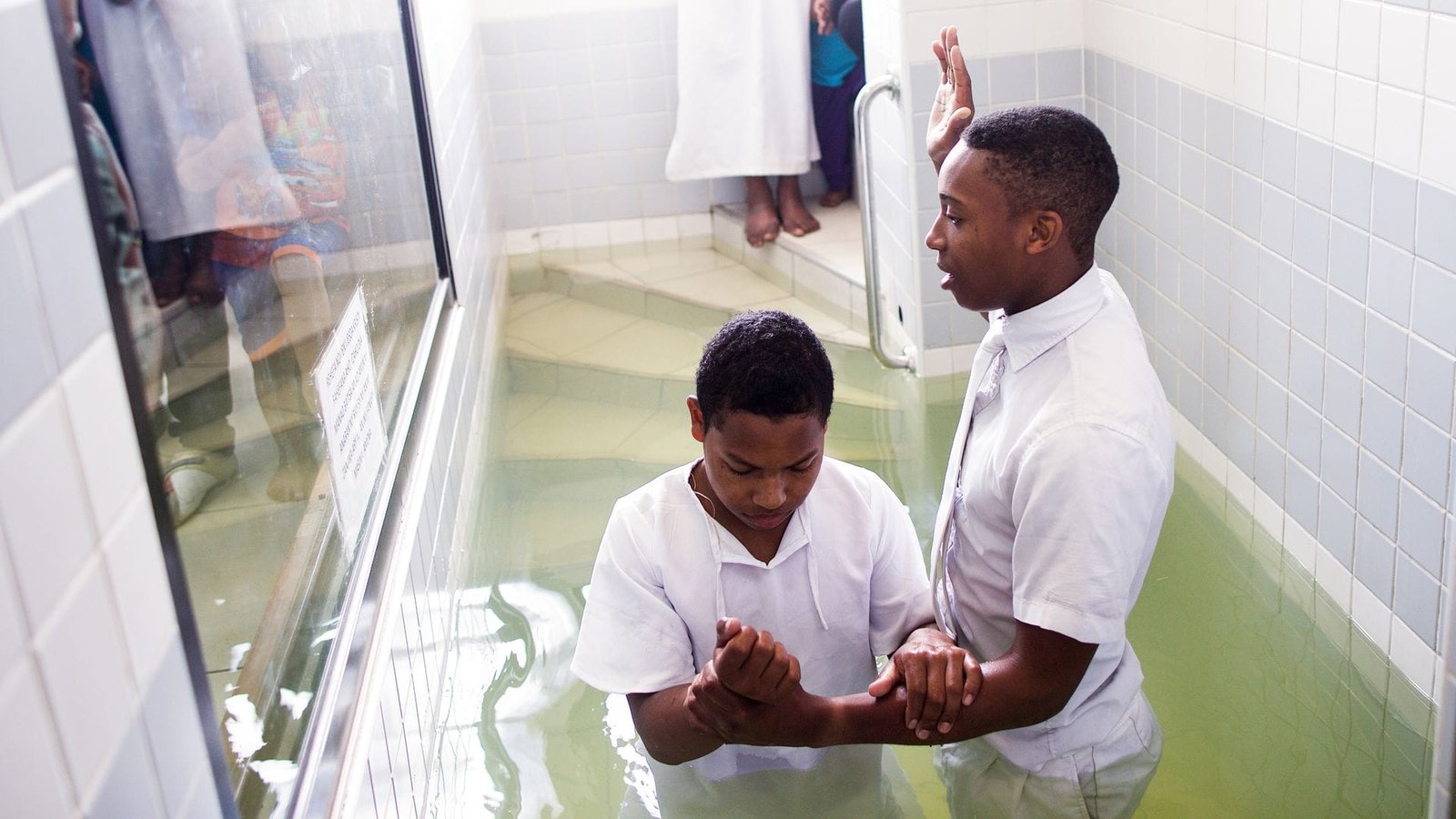In a revelation to Joseph Smith in September 1832, the Lord taught about the priesthood, concluding, “[T]his is according to the oath and covenant which belongeth to the priesthood.”1 But what does that mean? What is the oath and covenant of the priesthood?
The doctrine of the priesthood2 is one of the basic, fundamental doctrines of the Church of Jesus Christ of Latter-day Saints. The General Handbook of the Church states, “Through the priesthood, God accomplishes His work of salvation and exaltation.”3 However, the oath and covenant of the priesthood is probably one of those “mysteries of godliness”4 that few of us understand.
This post gives some simple answers, but also provides resources for additional study.
What is a covenant?
In a prior post, “A Covenant Relationship with God,” I wrote about covenants. A covenant is typically defined as “a sacred agreement between God and a person or group of people. God sets specific conditions, and He promises to bless us as we obey those conditions.”5
It is significant to note that “[a]ll the saving ordinances of the priesthood are accompanied by covenants.”6 It is no wonder, then, that those who receive the priesthood do so with a covenant.
What is the simple answer?
The oath and covenant of the priesthood is a lengthy topic worthy of significant study. However, there is a simple answer:
“When a man receives the Melchizedek Priesthood, he enters into the oath and covenant of the priesthood. He covenants to be faithful, magnify his calling, ‘give diligent heed to the words of eternal life,’ and ‘live by every word that proceedeth forth from the mouth of God.’ Those who keep this covenant will be sanctified, or made clean and holy, by the Spirit and receive ‘all that [the] Father hath.'”7
What is the longer answer?
That simple statement clearly explains what is expected of those who receive the Melchizedek Priesthood, and what God promises them if they keep their covenants. However, it can take study and experience to begin to understand the oath and covenant of the priesthood.
Doctrine and Covenants 84
Section 84 of the Doctrine and Covenants states the oath and covenant of the priesthood:
- 33 For whoso is faithful unto the obtaining these two priesthoods of which I have spoken, and the magnifying their calling, are sanctified by the Spirit unto the renewing of their bodies.
- 34 They become the sons of Moses and of Aaron and the seed of Abraham, and the church and kingdom, and the elect of God.
- 35 And also all they who receive this priesthood receive me, saith the Lord;
- 36 For he that receiveth my servants receiveth me;
- 37 And he that receiveth me receiveth my Father;
- 38 And he that receiveth my Father receiveth my Father’s kingdom; therefore all that my Father hath shall be given unto him.
- 39 And this is according to the oath and covenant which belongeth to the priesthood.
- 40 Therefore, all those who receive the priesthood, receive this oath and covenant of my Father, which he cannot break, neither can it be moved.
Magnifying our calling
In October 1980, Marion G. Romney, the Second Counselor in the First Presidency, gave a talk titled “The Oath and Covenant Which Belongeth to the Priesthood.” He taught the following:
- A covenant is an agreement between two or more parties.
- An oath is a sworn attestation to the inviolability of the promises in the agreement.
- In the covenant of the priesthood the parties are the Father—that’s the Lord—and the receiver of the priesthood.
- The receiver undertakes to magnify his calling in the priesthood.
- The Father, by oath and covenant, promises the receiver that if he does so magnify his priesthood he will be sanctified by the Spirit unto the renewing of his body; that he will become a member of “the church and kingdom, and the elect of God,” and receive the “Father’s kingdom; therefore,” said the Savior, “all that my Father hath shall be given unto him” (D&C 84:33–34, 38).
President Romney’s comments help us understand why this topic is so much more expansive than the simple answer:
- Now let us consider for a moment just what magnifying one’s calling in the priesthood means.
- The only way a man can make the maximum progress towards eternal life, for which mortality is designed, is to obtain and magnify the Melchizedek Priesthood.
- I am persuaded that [magnifying our callings in the priesthood] requires at least the following three things:
- That we obtain a knowledge of the gospel.
- Our purpose in urging all bearers of the Melchizedek Priesthood to read the Book of Mormon is that they may learn more about the gospel.
- That we comply in our personal living with the standards of the gospel.
- Learning the gospel from books, however, is not enough. It must be lived by one who would magnify his calling in the priesthood.
- That we give dedicated service.
- [The commandments] put on every bearer of the priesthood the stimulating responsibility to render service—service in carrying the restored gospel, with all the blessings of the priesthood, to the peoples of the earth; and service in comforting, strengthening, and perfecting the lives of one another and all the Saints of God.
- That we obtain a knowledge of the gospel.
Additional Study
As President Romney taught, we need to study the gospel, live its principles, and give service. The following resources will help us gain a greater knowledge of the oath and covenant of the priesthood.
I previously wrote The Priesthood: a Study Guide, which contains significant resources regarding the priesthood. It primarily focuses on priesthood keys and authority, but a comprehensive study of the priesthood is essential to understanding the oath and covenant of the priesthood.
Serving with Love
In Doctrine and Covenants 121:34-46, a beautiful letter written by Joseph Smith from Liberty Jail, the Lord taught how those who hold the priesthood should magnify their callings:
“No power or influence can or ought to be maintained by virtue of the priesthood, only by persuasion, by long-suffering, by gentleness and meekness, and by love unfeigned; By kindness, and pure knowledge, which shall greatly enlarge the soul without hypocrisy, and without guile.”8
Magnifying our calling in the priesthood requires love, kindness, patience, and charity.
As we magnify the priesthood with charity, the Lord teaches that “the doctrine of the priesthood shall distil upon [our] soul as the dews from heaven.”9 I believe this means that it takes study, experience, and time to truly begin to understand the oath and covenant of the priesthood. But there is no question that we can only fulfill our responsibilities pertaining to the oath and covenant of the priesthood as we serve with love.
References
- Doctrine and Covenants 84:39. ↩︎
- Doctrine and Covenants 121:45, “[T]he doctrine of the priesthood shall distil upon thy soul as the dews from heaven.” ↩︎
- General Handbook, 1.3.1, “Priesthood Authority and Keys,” https://www.churchofjesuschrist.org/study/manual/general-handbook/1-work-of-salvation-and-exaltation?lang=eng&id=p37#p37. ↩︎
- Doctrine and Covenants 19:10, “For, behold, the mystery of godliness, how great is it!” ↩︎
- Topics and Questions, “Covenant,” https://www.churchofjesuschrist.org/study/manual/gospel-topics/covenant?lang=eng&id=intro1#intro1. ↩︎
- Topics and Questions, “Covenant.” ↩︎
- Topics and Questions, “Melchizedek Priesthood,” https://www.churchofjesuschrist.org/study/manual/gospel-topics/melchizedek-priesthood?lang=eng&id=p_kk2mW#p_kk2mW. ↩︎
- Doctrine and Covenants 121:41-42. ↩︎
- Doctrine and Covenants 121:45. ↩︎



